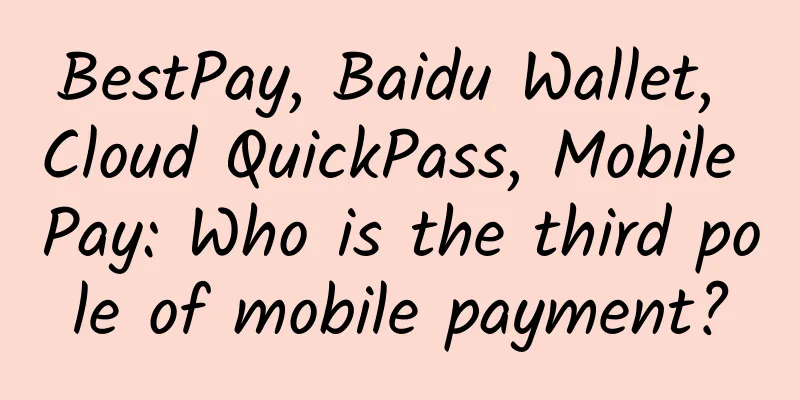BestPay, Baidu Wallet, Cloud QuickPass, Mobile Pay: Who is the third pole of mobile payment?

|
"Ding", "Payment successful", A Ming (pseudonym), who returned home from Shanghai to celebrate the Spring Festival, successfully used the WeChat payment function to buy a box of beer in a small grocery store in the southwest countryside. Later, he exchanged "Huahua Cards" with the children of his relatives in his hometown in order to ask for help in paying off Huabei. During the Spring Festival, Xiao Li rarely used cash in his hometown, and basically used WeChat or Alipay mobile payments. From Amin’s experience, we can see that the development of China’s mobile payment has reached the point of “going to the mountains and the countryside”, and we can also clearly see that the mobile payment industry has a clear two-tier structure of WeChat and Alipay. Mobile payment industry players grasp the value Alipay and Tenpay (including but not limited to WeChat Pay) have dominated China's mobile payment industry for many years. According to iResearch Consulting data, Tenpay and Alipay accounted for 94% of the market share in Q1 2018, making them the undisputed kings. Alipay and Tenpay became the kings not only by "first movers", but also by strength. First, both have a good mass base, with monthly active users of Alipay and WeChat exceeding 400 million. Second, both offer good user experience, not only providing fast payment methods, but also being universally accepted online and offline across the country. Both are also more internationalized than similar domestic products. Alipay already supports more than 40 countries and regions, and Tenpay has payment access in 49 countries. The status of Alipay and Tenpay remains unrivaled, but a small part of the market is still left. Since China's mobile payment is a trillion-dollar cake with three major values, even a 6% market share is enough to give birth to the "third pole".
To this end, while Alipay and WeChat were building their moats, a large number of third-party payment software also emerged. The "players" participating in the breakout battle in the mobile payment industry are mainly composed of four categories: traditional financial institutions, telecom operators, Internet companies and mobile phone hardware manufacturers. Among them, Baidu Wallet, BestPay, Cloud QuickPass, Huawei Pay and Apple Pay are the leaders in their respective industries. WingPay: Affordable The company that is challenging the "third throne" is WingPay, led by China Telecom, which ranks second only to Alipay in iResearch Qianfan. Data shows that in February 2019, WingPay had 26.181 million monthly active users and 2.714 million daily active users. The main driving force behind WingPay's current success is internal factors. It has two unique advantages compared with other similar platforms (except Alipay and Tenpay). On the one hand, the platform offers great preferential treatment to users (including merchants). In 2018, Yifu Pay spent 6 billion to subsidize users, and in 2019 it plans to invest 20 billion in red envelope resources. Such preferential treatment is significantly higher than that of its competitors at the same level. On the other hand, the platform has a wide range of consumption scenarios. Not only can it complete daily consumption, financial management and life payment online, but it can also be used in many offline consumption scenarios, such as shopping in supermarkets and refueling at gas stations. However, as an emerging mobile payment platform, Yifu Pay still has some obvious shortcomings that need to be addressed. Two of them are the most obvious. First, although there are many financial services on the platform, this is both an advantage and a disadvantage, because it is difficult to guarantee the quality of financial products with many financial products, and it is inevitable that there will be unevenness; second, the platform user stickiness is low. The main operating data released by China Telecom in December 2018 showed that its mobile users reached 303 million, but the monthly active users of Yifu Pay users were only 26.181 million, and the user conversion rate was less than 10%. Baidu Wallet: Traffic type The BAT structure of China's Internet industry has lasted for many years. How can the mobile payment industry be without Baidu? In 2019, Baidu took over the baton of the red envelope war between Alibaba and Tencent. Relying on the interaction of red envelopes during the Spring Festival Gala, Baidu Wallet's various data ushered in a wave of growth. The number of global audiences participating in Baidu APP red envelope interaction activities reached 20.8 billion times. It is roughly estimated that Baidu Wallet had more than 40 million new users during the Spring Festival, and Baidu Wallet has greatly increased its vitality. In fact, Baidu Wallet has always had some natural advantages over other players of the same level. One advantage is that Baidu Wallet supports more online consumption scenarios. Baidu Wallet relies on Baidu's huge software ecosystem and basically covers most consumption scenarios such as "eating, drinking, playing and having fun". The second advantage is its strong financial technology capabilities. Baidu Wallet is a third-party mobile payment platform under Du Xiaoman. Du Xiaoman Finance is an excellent domestic financial technology platform, and its platform's bad debt rate is far lower than the industry average. In addition, Baidu Wallet has a high reputation. In addition to relying on the existing reputation of Baidu and BAT, the interactive red envelopes of the 2019 Spring Festival Gala have made Baidu Wallet even more well-known. Although Baidu Wallet has many advantages, it also has some disadvantages. For example, Baidu Wallet's offline payment capabilities are relatively weak. Mobile payment includes two payment scenarios: online and offline. Baidu Wallet supports fewer offline payment scenarios. Except for some POS, it is difficult to find offline merchants that support Baidu Wallet payment. Cloud QuickPass: Moderate Cloud QuickPass ranks high in the data activity ranking of Analysys Qianfan, with 16.432 million monthly active users, slightly lower than BestPay, but its daily active users are as high as 6.009 million, several times that of BestPay. Cloud QuickPass's high user activity makes it a mobile payment platform that cannot be underestimated. As we all know, Cloud QuickPass is a third-party mobile payment platform launched by China UnionPay to coordinate major commercial users and payment institutions. It has natural advantages in terms of user numbers, cross-bank operations and payment scenarios. UnionPay's official Weibo announced at the end of 2018 that the number of registered users of Cloud QuickPass has exceeded 100 million, and there are still huge potential users to be developed based on the user resources of banks. At the same time, relying on UnionPay's ability to integrate banks, Cloud QuickPass already supports inter-bank transfers between all commercial banks nationwide with zero service fees. This advantage is more attractive to users with large payment needs than any other third-party mobile payment platforms, including Alipay and Tenpay. In addition, Cloud QuickPass can support the use of many payment scenarios both online and offline. It supports daily consumption scenarios such as "food, clothing, housing, transportation", "payment of bills and financial management" online, and also supports railways, civil aviation, 100,000 convenience stores and supermarkets across the country, more than 30 universities, more than 100 vegetable markets, more than 300 cities' water, electricity, coal and other public service industry merchants offline, and has supported the use of more than 10 countries and regions around the world. Although Cloud QuickPass has many inherent advantages, it still has the problem of poor user experience. The poor user experience is mainly reflected in the slow arrival of red envelopes, the inconvenience of opening the APP to pay for daily payments, and the slow response of the APP due to inadequate optimization. Various types of mobile payment: free-range type In addition to the above payment platforms, mobile phone manufacturers with a large number of user resources have also paid attention to mobile payment, among which Huawei Pay, Apple Pay and Xiaomi Wallet are the most outstanding. A big advantage of mobile phone manufacturers' mobile payment platforms is that they have a large number of potential users. In 2018, Huawei, Xiaomi and Apple had a total of no less than 500 million users (only in China). Another major advantage they have is the high APP installation rate, with their own mobile phone users installing 100% of their apps, an advantage that Internet companies, traditional financial institutions, and telecom operators of the same level cannot achieve. In addition, they also have hardware support, and the mid-range and above mobile phones of the three companies basically have NFC functions, which makes their mobile payment platforms more convenient and faster to use. However, their shortcomings are more obvious than those of other players of the same level. First, these three major mobile payment platforms lack core competitiveness. The platform functions are similar to those of mainstream mobile payment platforms on the market, and even the functions and experience are lower than those of mainstream mobile payment platforms. Second, the products are highly homogenized and the user conversion rate is low. For example, although Huawei has hundreds of millions of users and the installed base of Huawei Pay exceeds 300 million, the monthly active users of Analysys Qianfan in February 2019 were only 85,000, and the user conversion rate was less than 1%. Limited changes in the mobile payment industry Based on the above analysis, China's mobile payment industry will usher in two major trends in the next 1-3 years. First, in the short term, the status of WeChat and Alipay remains unshakable. Although the four new payment platforms have made some achievements, they are still dozens or even hundreds of times behind the two giants in terms of the richness and ease of use of online and offline payment scenarios and user stickiness. Second, domestic users will have more options for mobile payment platforms. Although the four mobile payment platforms, including BestPay and Cloud QuickPass, lag behind Alipay and Tenpay as a whole, they also have certain advantages in some vertical fields. For example, Cloud QuickPass has an advantage over Alipay and Tenpay in large-value payments and inter-bank transactions. The convenience of various mobile payments in NFC payment scenarios is also better than Alipay and Tenpay. Baidu Wallet and BestPay also have advantages over the "two giants" in certain specific scenarios in various fields. Users have more choices in mobile payments. In general, the current preferred mobile payment methods are still Alipay and Tenpay, but with the continuous improvement of other third-party mobile payment platforms, the mobile payment industry will become more and more lively in the future, and the third pole will soon enter thousands of households. |
<<: Which domestic mobile phone system is the best? Comparison of the six major mobile phone systems
>>: A conversation with Wannianli CTO Luo Shilong about the programmer's brilliant transformation
Recommend
How to make 100 yuan a day, and what side job can make 3,000 yuan a month?
People in the workplace always have the idea and ...
50 practical methods to cultivate independent learning ability and get into a prestigious school with high scores
Doushen Chinese Language Peking University Master...
Whenever I talk to others about my work, I always say “a glimpse of the leopard through the tube can reveal a part of it” (Part 2)
Produced by: Science Popularization China Author:...
15 essential data indicators for product operations
This is the first lesson I shared with the team o...
The number of followers increased by 300,000. How is this Douyin account operated?
If you want to seize the dividends of the industr...
Apple, which is "never satisfied", continues to attack from all sides
[[136329]] Although the outside world had basical...
Unexpectedly, the fall of ancient Chinese feudal dynasties was related to volcanic eruptions.
What do we think of when we think of volcanic eru...
This kind of food that you think is very "dirty" is actually rich in nutrients
Duck blood is a very common food ingredient, smoo...
30 high-quality cases of information flow advertising in 15 industries for your reference!
One month has passed in 2018. We often say: Once ...
Complete disintegration of body functions, how dangerous is critical testing? Why is there no cure for radiation damage?
There is no need to say much about the power of t...
What is the algorithm of Tik Tok’s recommendation mechanism?
The reason why Tik Tok is so popular is definitel...
Why do Android fans choose iPhone 6s instead of Nexus 6P?
Antonio Villas Boas is a technology journalist. A ...
(Big Soldier Data Flow Operation) Dou+ Doujia Practical Tutorial
(Big Soldier Data Flow Operation) Dou+ Doujia Pra...
QQ is updated again! A wave of new features is coming
Recently, Tencent QQ iOS version has been updated...
7 Ways to Use Tik Tok for Marketing Purposes
Recently, I saw a few complaints about Douyin in ...









